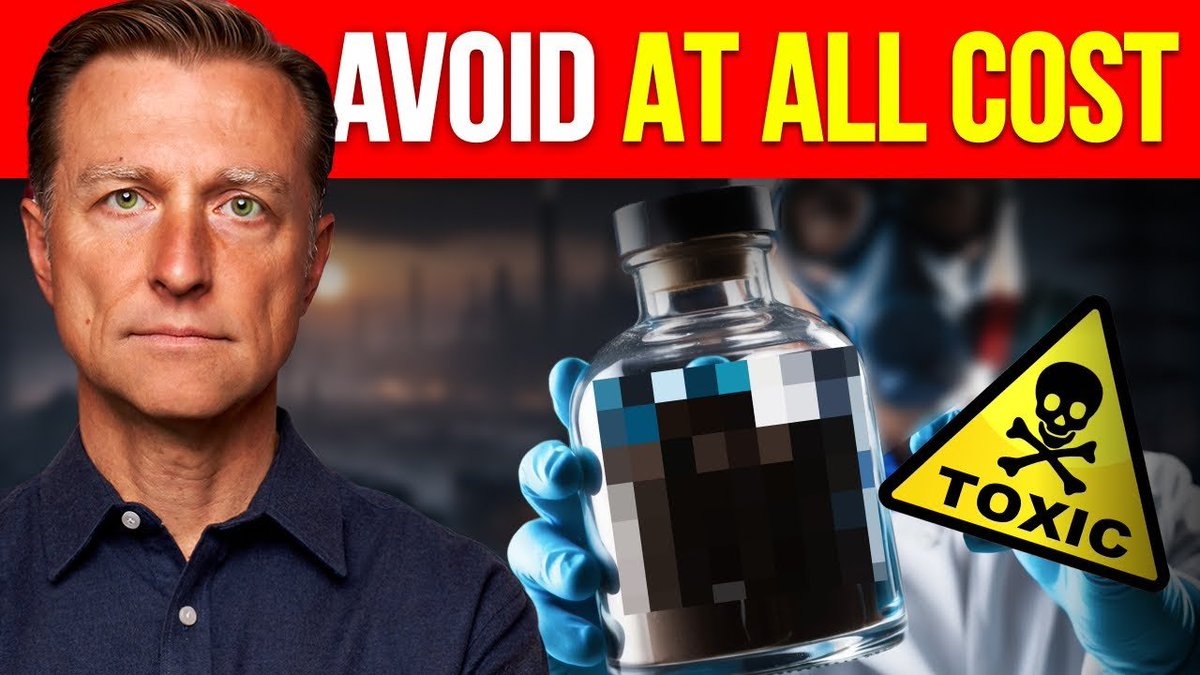What Happens When Your Body Is Severely Vitamin D Deficient?
These 12 bizarre symptoms might shock you.
You May Never Skip Your Vitamin D Again After Reading This:
1/ Your head starts sweating uncontrollably... 🧵 (THREAD)
These 12 bizarre symptoms might shock you.
You May Never Skip Your Vitamin D Again After Reading This:
1/ Your head starts sweating uncontrollably... 🧵 (THREAD)

Strange, but true.
This bizarre symptom shows up in infants, teenagers, and adults. Excessive head sweating is a red flag, especially in children.
But why?
This bizarre symptom shows up in infants, teenagers, and adults. Excessive head sweating is a red flag, especially in children.
But why?
First, 25,000 genes exist in your body.
10% are directly controlled by vitamin D. Your blood tests only show inactive vitamin D — not what's happening in your cells...
10% are directly controlled by vitamin D. Your blood tests only show inactive vitamin D — not what's happening in your cells...
When Dr. Hollis presented his findings to top vitamin D researchers, he was attacked for his conclusions.
Why? Because effective vitamin D treatment directly competes with the top-selling drugs on the market.
Here are 10 more vitamin D deficiency symptoms you should know:
Why? Because effective vitamin D treatment directly competes with the top-selling drugs on the market.
Here are 10 more vitamin D deficiency symptoms you should know:
2/ Your sleep gets destroyed by night sweats.
You wake up with a soaked pillow despite cool temperatures.
Vitamin D deficiency triggers an overactive immune response, disrupting your body's temperature control center:
You wake up with a soaked pillow despite cool temperatures.
Vitamin D deficiency triggers an overactive immune response, disrupting your body's temperature control center:
3/ Your emotions become a rollercoaster.
Vitamin D directly controls your emotional regulation through complex brain pathways.
Adequate vitamin D levels help protect neurons and reduce inflammation, which can otherwise exacerbate mood disorders.
Vitamin D directly controls your emotional regulation through complex brain pathways.
Adequate vitamin D levels help protect neurons and reduce inflammation, which can otherwise exacerbate mood disorders.
4/ When you're vitamin D deficient, you run the risk of a dysfunctional immune system.
This may cause symptoms like:
• Autoimmune Reactions
• Recurrent Infections
• Chronic Fatigue
• Inflammation
Here's why:
This may cause symptoms like:
• Autoimmune Reactions
• Recurrent Infections
• Chronic Fatigue
• Inflammation
Here's why:
5/ Your motivation vanishes completely.
Tasks pile up. Everything feels overwhelming.
This isn't laziness — it's your brain's motivation center malfunctioning without vitamin D.
Tasks pile up. Everything feels overwhelming.
This isn't laziness — it's your brain's motivation center malfunctioning without vitamin D.
6/ Panic attacks strike unexpectedly.
These aren't just anxiety episodes. Your brain's fear center is malfunctioning from a lack of vitamin D, disrupting crucial serotonin pathways.
These aren't just anxiety episodes. Your brain's fear center is malfunctioning from a lack of vitamin D, disrupting crucial serotonin pathways.
7/ A deep ache sets into your bones.
Not sharp pain, but a deep internal ache — especially in your:
• Hips
• Pelvis
• Upper legs
• Lower back
This is osteomalacia beginning — your bones literally softening. Here's how it works:
Not sharp pain, but a deep internal ache — especially in your:
• Hips
• Pelvis
• Upper legs
• Lower back
This is osteomalacia beginning — your bones literally softening. Here's how it works:
8/ Your muscles start failing you.
Without vitamin D, calcium can't enter your muscle cells properly.
The result? Progressive weakness, especially in the legs and shoulders. Your muscles physically can't contract.
Without vitamin D, calcium can't enter your muscle cells properly.
The result? Progressive weakness, especially in the legs and shoulders. Your muscles physically can't contract.
9/ Your joints become stiff.
Stiffness takes over your knees and fingers as vitamin D is crucial for cartilage and collagen.
10/ Fatigue becomes your new normal.
Your cellular energy factories (mitochondria) are dying. Old viruses can reactivate, draining you further.
Stiffness takes over your knees and fingers as vitamin D is crucial for cartilage and collagen.
10/ Fatigue becomes your new normal.
Your cellular energy factories (mitochondria) are dying. Old viruses can reactivate, draining you further.

11/ Your brain feels like it's in a fog.
Decision-making becomes impossible. Focus vanishes.
12/ You can't stop eating yet never feel satisfied.
Without vitamin D, nutrients can't properly enter your cells, leaving you constantly craving more.
Decision-making becomes impossible. Focus vanishes.
12/ You can't stop eating yet never feel satisfied.
Without vitamin D, nutrients can't properly enter your cells, leaving you constantly craving more.
How much vitamin D do you need?
40 minutes of sun gives you 20,000 IU of vitamin D3.
For different deficiencies, try:
- 10,000-20,000 IU for general deficiency.
- 50,000 IU of vitamin D3 daily for chronic fatigue.
Toxicity occurs when taking 100,000 IU daily for weeks.
40 minutes of sun gives you 20,000 IU of vitamin D3.
For different deficiencies, try:
- 10,000-20,000 IU for general deficiency.
- 50,000 IU of vitamin D3 daily for chronic fatigue.
Toxicity occurs when taking 100,000 IU daily for weeks.
Essential cofactors for vitamin D are magnesium, vitamin K2, zinc, and B6.
Without these, you won't get the full benefits. This is why most vitamin D supplements fail.
Without these, you won't get the full benefits. This is why most vitamin D supplements fail.
Effective vitamin D supplementation threatens a multi-billion dollar drug industry.
The medical establishment actively suppresses this information.
But the science is clear: vitamin D deficiency underlies many modern health problems.
The medical establishment actively suppresses this information.
But the science is clear: vitamin D deficiency underlies many modern health problems.

A bit about me:
I am the creator of Healthy Keto® & Intermittent Fasting protocols.
I educate millions on nutrition and wellness, empowering over 100M people to make healthier choices.
Join me on a journey to maintain vitality and lose weight while enjoying life.
I am the creator of Healthy Keto® & Intermittent Fasting protocols.
I educate millions on nutrition and wellness, empowering over 100M people to make healthier choices.
Join me on a journey to maintain vitality and lose weight while enjoying life.

That's a wrap!
What is ONE thing you learned from this thread? Comment below...
And follow me @dr_ericberg to join my mission to provide evidence-based insights to improve your health and longevity.
What is ONE thing you learned from this thread? Comment below...
And follow me @dr_ericberg to join my mission to provide evidence-based insights to improve your health and longevity.
https://twitter.com/1658481854230478850/status/1877339624491856195
• • •
Missing some Tweet in this thread? You can try to
force a refresh








